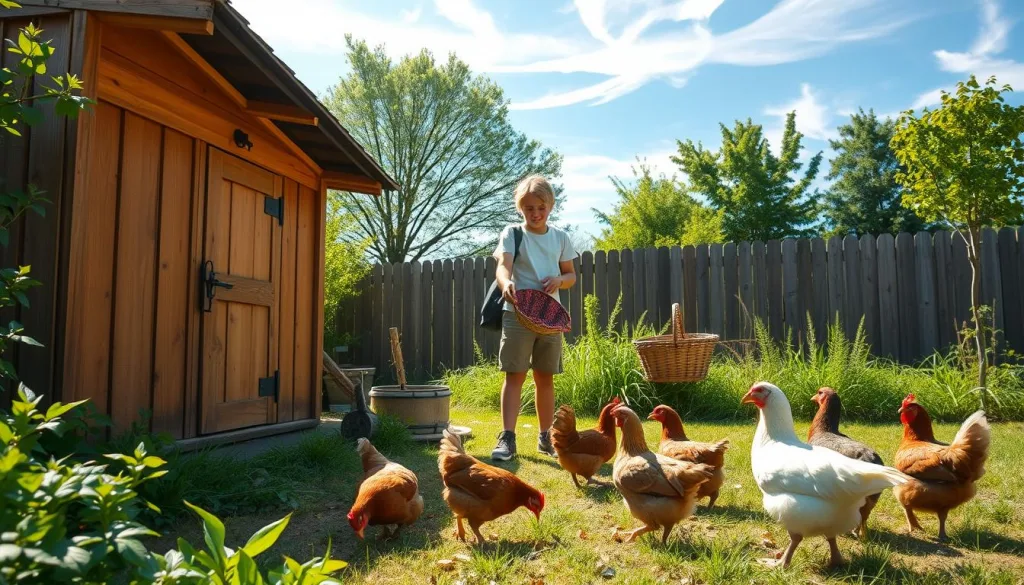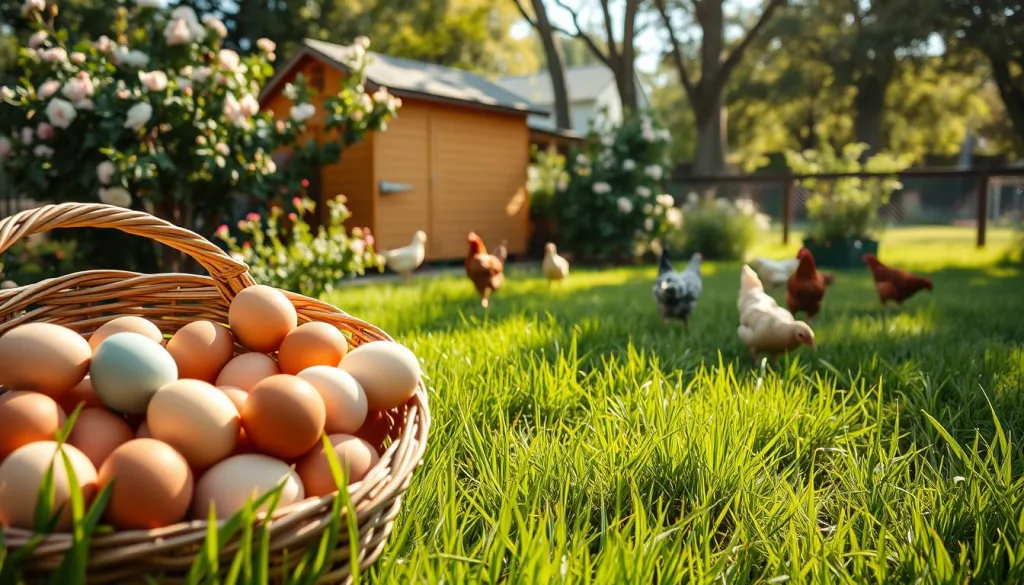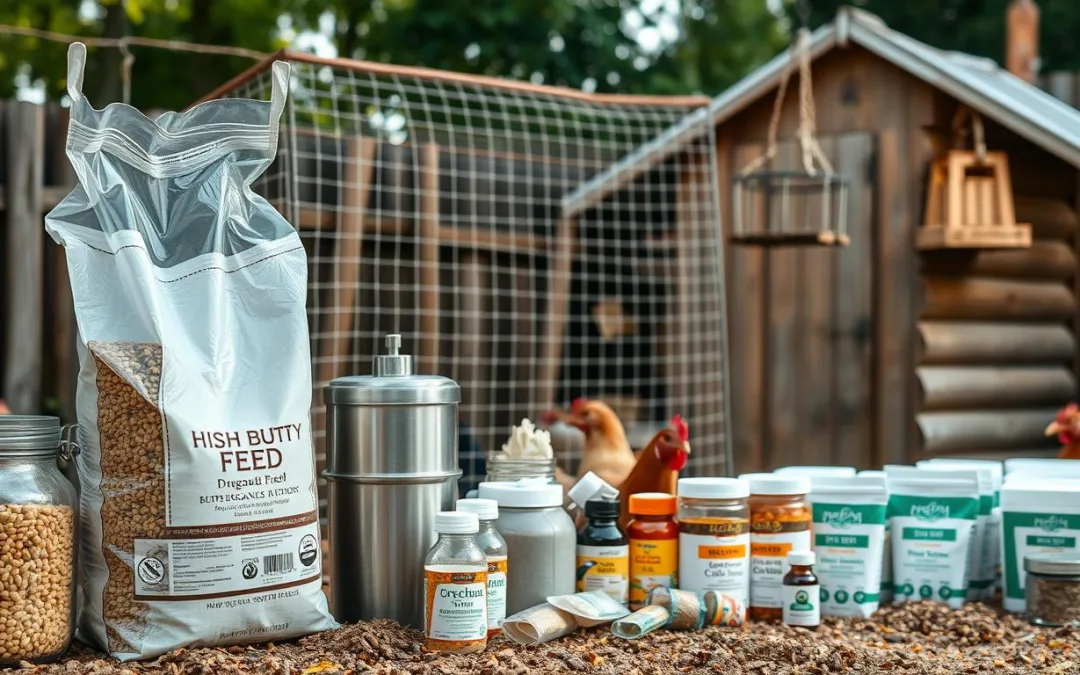Raising backyard chickens is a growing trend for those who want to live more sustainably. It’s a great way to get fresh eggs, control pests, and enjoy a fun hobby. It’s perfect for city and suburban folks who want to try small-scale farming.
I’m all about self-sufficiency, and I’ve found that raising backyard chickens is more than just buying a few birds. It’s about creating a space where they can thrive. You need to plan well and take care of them every day to keep them happy and healthy.
Key Takeaways
- Backyard chickens provide fresh eggs and natural pest control
- Proper space and coop design are critical for chicken health
- A small flock of four chickens is ideal for beginners
- Chickens require consistent care and daily maintenance
- Understanding local regulations is essential before starting
- Chicken keeping can be an affordable and rewarding hobby
Getting Started with Backyard Chickens: Essential Basics
Starting urban chicken farming needs careful planning. You must know about local laws, space, and what to buy first.
Legal Considerations and Local Regulations
First, check your local laws on chickens. Cities have rules on:
- How many chickens you can have
- Where you can keep them
- How close to your property lines
- If you can have roosters
Space Requirements for Your Flock
Managing space is key in urban chicken farming. Each chicken needs:
- 3-4 square feet inside the coop
- 10-12 inches for roosting
- 10 square feet if they’re always inside
Pro tip: Think about growing your flock when you first set up.
Initial Cost Considerations
Starting a backyard chicken project costs money. The total cost is $500 to $700. You’ll need to buy:
- Chicks: $30 for 6
- A chicken coop: About $775
- A feeder: Around $20
- A waterer: About $40
- Initial food and supplies: Varies
With good planning, your urban chicken farm will be a fun and rewarding place. It will give you fresh eggs and friends.
Benefits of Raising Backyard Chickens
Raising backyard poultry is a great choice for homeowners and garden lovers. It’s more than a hobby; it’s a way to live sustainably. You get many benefits, not just fresh eggs.
One big plus is the eggs they lay. A flock can give you 4-7 eggs per week. Hens lay the most in their first year. Studies from Cambridge University show:
- Twice as much vitamin E
- Higher long-chain omega-3 fatty acids
- Superior nutritional profile compared to store-bought eggs
Chickens do more than just lay eggs. They help control pests in your garden. Their manure is great fertilizer, making your soil better.
“Chickens are like living, breathing garden companions that produce food and improve your landscape simultaneously.”
There are also economic benefits. Keeping chickens can save you money. You might spend about $3 per dozen on eggs. This is less than what you’d pay at farmers’ markets.
Chickens are also wonderful pets. They’re social and can have their own personalities. They teach kids and adults about taking care of animals and living sustainably.
Choosing the Right Chicken Coop Setup
Creating the perfect chicken coop setup is key for your backyard chickens’ health and happiness. A well-designed coop protects, comforts, and provides the best living conditions for your feathered friends.
When planning your chicken coop setup, several key factors are important. Space, design, and functionality are critical in creating an ideal home for your chickens.
Coop Size and Design Features
The right coop size depends on your backyard chicken breeds. Different chicken sizes need different amounts of space:
- Small chickens: 2 square feet interior space per bird
- Medium chickens: 3 square feet interior space per bird
- Large chickens: 4 square feet interior space per bird
Ventilation and Protection Requirements
Proper ventilation is key for chicken health. Experts say to design ventilation to cover one-fifth of the total wall space. This helps prevent respiratory issues and keeps the environment healthy.
| Coop Feature | Recommended Specification |
|---|---|
| Elevation from Ground | 8-12 inches |
| Roosting Bar Height | 2 feet off the ground |
| Roosting Space per Chicken | 8 inches |
Nesting Box Specifications
Nesting boxes are vital for egg production. A general guideline suggests one nesting box for every 4-5 hens. Each box should be about 1 square foot, ensuring comfortable laying spaces for your chickens.
Investing in a quality chicken coop setup costs between $200 to $400 for pre-built options. DIY enthusiasts can make custom coops using recycled materials, potentially saving money.
Essential Equipment and Supplies
Starting urban chicken farming needs careful planning and the right tools. The cost for setting up a backyard chicken area is about $1,500 to $2,000. It’s important to pick your supplies carefully.
Core Equipment for Chicken Keeping
To keep chickens well, you need the right tools and supplies. Here are the must-haves for every chicken owner:
- Brooder box for young chicks
- Brooder lamp with heat source
- Feeders and waterers
- Bedding materials
- Cleaning supplies
Detailed Equipment Breakdown
| Equipment | Recommended Specifications | Cost Estimate |
|---|---|---|
| Brooder Box | Plastic storage bin, 2-3 feet long | $30-$50 |
| Heat Lamp | Infrared, hanging design | $40-$60 |
| Feeder | Gallon-sized, covered design | $25-$35 |
| Waterer | Nipple-style, prevents contamination | $20-$30 |
When you start your urban chicken farm, focus on safety and cleanliness. Use bedding like pine shavings, which are clean and free of dust. For chicks, keep the temperature steady and give them enough room to move.
Keeping a small flock of 10-15 chickens costs about $50 a month. By buying good equipment and following care tips, you’ll make a great home for your chickens.
Feeding and Nutrition Guidelines
Proper nutrition is key for successful backyard chicken farming. Knowing the right feed strategies is vital for your flock’s health and productivity.
Chickens need specific nutrients at different life stages. Organic chicken farming requires careful diet and nutrient balance.
Types of Feed for Different Life Stages
Feeding chickens needs a strategic plan based on their age and purpose:
- Chicks (0-6 weeks): Need starter feed with 20-22% protein
- Pullets (6-18 weeks): Need grower feed with 16-18% protein
- Laying Hens (18+ weeks): Require layer feed with 16-18% protein
Water Requirements and Management
Water is vital for chicken health. Chickens drink about 500 ml per day, twice as much as they eat. Make sure they have clean, fresh water always.
Supplements and Treats
“A balanced diet is the key to healthy, productive chickens.” – Poultry Nutrition Expert
When adding supplements to your chicken feed, focus on:
- Calcium supplements for laying hens
- Grit for digestion
- Occasional kitchen scraps (in moderation)
Remember, scratch feed should not replace a complete, balanced diet. Organic chicken farming values nutritional quality over quantity.
Daily Care and Maintenance Routines
Keeping backyard chickens healthy and happy needs a daily routine. Beginner tips start with knowing the key tasks. These make chicken care easy and fun.

Effective daily care includes several important steps. These tasks usually take only 10-15 minutes. Here’s what you need to do:
- Morning routine: Open coop pop hole, check food and water
- Midday tasks: Collect eggs, observe flock behavior
- Evening responsibilities: Secure coop, ensure chickens are safe
Collecting eggs is a big part of chicken care. Hens lay about six eggs a week. It’s important to pick up eggs at least twice a day. This keeps them clean and stops hens from getting broody.
| Daily Task | Time Required | Purpose |
|---|---|---|
| Water Check | 2-3 minutes | Ensure fresh, clean water availability |
| Feed Inspection | 2-3 minutes | Maintain proper nutrition |
| Health Observation | 3-5 minutes | Detect early health issues |
“Consistency is key in chicken keeping. A few minutes of daily care can prevent major health issues and ensure a happy, productive flock.”
Weekly care is also vital. Clean the coop once a week to check for damage, pests, or health problems. In summer, give chickens shade and cool water. In winter, make sure water doesn’t freeze and add extra warmth.
Health Management and Disease Prevention
Keeping your chickens healthy is key to successful backyard chicken care. Urban chicken farming needs careful health management to stop diseases. Knowing common health issues and using strong biosecurity can keep your chickens safe.
Chickens face many health challenges that need early action. The National Poultry Improvement Plan offers important advice for keeping your flock healthy and stopping disease spread.
Common Health Issues
Backyard chickens can get sick with several problems:
- Parasitic infections
- Respiratory diseases
- Nutritional deficiencies
- External injuries
Biosecurity Measures
Good biosecurity is vital in urban chicken farming to lower disease risks:
- Quarantine new birds for 30 days
- Use dedicated clothing and footwear
- Limit visitor access to chicken areas
- Maintain clean equipment
Regular Health Checks
Regular checks are important to catch health problems early. Do weekly checks to keep your chickens healthy and lively.
| Health Check Component | Frequency | Key Observations |
|---|---|---|
| Physical Examination | Weekly | Check weight, feather condition, mobility |
| Droppings Inspection | Daily | Monitor color, consistency, abnormalities |
| Veterinary Consultation | Annually | Comprehensive health assessment |
“Prevention is always better than cure in backyard chicken care.” – Poultry Health Expert
By using these methods, you can build a strong health system for your backyard chickens. This ensures they live long and healthy lives.
Egg Production and Collection

Raising backyard chickens is exciting, and egg production is a big part of it. Hens usually lay 4-5 eggs a week. They lay more eggs in spring and summer.
Knowing how egg-laying works is key. Chickens start laying eggs at 4-6 months. They can keep laying eggs for 3-5 years. Under the best conditions, they can lay about 300 eggs a year.
Factors Influencing Egg Production
- Daylight hours
- Nutrition quality
- Hen age
- Breed characteristics
- Environmental stress
Seasons affect how many eggs hens lay. In winter, they might lay only 1 egg a week. More daylight helps them lay more eggs.
Egg Collection Best Practices
- Collect eggs twice daily
- Use clean nesting boxes (1 box per 3-5 hens)
- Store fresh eggs at consistent temperatures
- Check for egg quality and possible health issues
Good food is important for egg quality. Make sure your chickens eat balanced food with enough protein.
Fresh eggs from backyard chickens taste better and are healthier than store-bought ones.
By knowing how egg production works, you can get the most from your backyard chickens. You’ll have a steady supply of tasty, fresh eggs.
Seasonal Care and Weather Considerations
Urban chicken farming needs you to know how seasons affect your chickens. Each season brings its own challenges for keeping chickens happy and healthy.
In winter, you must watch out for health issues. Chickens need 14 hours of daylight to lay eggs well. But, short days mean fewer eggs. Cold weather can cause frostbite and hypothermia, so keeping the coop warm is vital.
- Insulate coop walls and floors to retain heat
- Provide supplemental heat when temperatures drop below 35°F
- Apply petroleum jelly to combs and wattles to prevent frostbite
- Increase feed intake by 25% during cold months
Summer brings its own set of problems with heat stress. Backyard chicken care in hot weather needs smart cooling methods:
- Ensure constant access to fresh, cool water
- Create shaded areas in the chicken run
- Use fans or misters to reduce ambient temperature
- Avoid overcrowding in the coop
Spring and fall are milder, perfect for urban chicken farming. These seasons are great for keeping your flock healthy and ready for harsher weather.
Adjusting your chicken care to the seasons helps keep your flock healthy all year. Watching your chickens closely and managing their care well is essential for successful backyard chicken keeping.
Understanding Chicken Behavior and Social Needs
Raising backyard chickens means learning about their complex social behaviors. These birds are not just simple farm animals. They are intelligent creatures with their own social structures and ways of communicating.
Chickens start forming their social dynamics early in life. By 1 week old, they begin to establish a pecking order. By 6 weeks, this order is fully set. During this time, they learn to communicate in over 30 different ways.
- Foraging behaviors occupy approximately 61% of their active time
- Chickens recognize individual flock members and understand social hierarchy
- Synchronous activities like dust bathing are key for social bonding
Social interactions are key to chicken happiness. When raising backyard chickens, it’s important to create an environment that supports their natural behaviors. Chickens have complex social rituals, like:
- Mutual preening
- Cooperative foraging
- Establishing and maintaining group hierarchy
Enrichment is important for healthy social dynamics. Giving them different substrates like mulch, sand, and dirt encourages exploration. Interactive activities prevent stress and reduce aggressive behaviors like feather pecking.
Understanding chicken behavior is key to creating a harmonious and thriving backyard flock.
Conclusion
Raising backyard chickens is a fun way to live sustainably and grow your own food. It takes planning, hard work, and a desire to learn. Start with 2-5 chickens and grow your skills in backyard chicken management.
Keeping chickens brings more than just eggs. You’ll feel closer to your food, enjoy the birds, and save money. A flock can give you an egg a day, and hens can lay for 4-5 years.
To keep chickens well, you must keep learning and be flexible. Watch your chickens’ health, keep their area clean, and be ready to change your ways. Each chicken is different, so understanding their needs is key to success.
Chicken keeping is more than a hobby. It’s a way to learn about sustainable farming, gain new skills, and enjoy fresh food at home. Face the challenges, celebrate the wins, and enjoy the journey of chicken keeping.
FAQ
How many chickens should I start with as a beginner?
What are the legal considerations for keeping backyard chickens?
How much space do chickens need?
What are the initial costs of raising backyard chickens?
What chicken breeds are best for beginners?
How often do chickens lay eggs?
What do chickens eat?
How do I protect my chickens from predators?
Source Links
- Guide To Raising Chickens Step By Step | Benefits Of Raising Chickens – https://www.thehenhousecollection.com/blog/guide-to-raising-chickens/
- How to Take Care of Raising Chickens as a Beginner – https://www.azurefarmlife.com/farm-blog/caring-for-chickens-101
- Raising Chickens 101: Everything You Need to Know – https://rootsandrefuge.com/raising-chickens-101-everything-you-need-to-know/
- A Beginner’s Guide to Raising Backyard Chickens for Eggs – https://montanahomesteader.com/a-beginners-guide-to-raising-backyard-chickens-for-eggs/
- Raising Chickens 101: How to Get Started – https://www.almanac.com/raising-chickens-101-how-get-started
- Benefits of Backyard Chickens – https://greenamerica.org/green-living/many-benefits-backyard-chickens
- Benefits of Backyard Chickens | Nature’s Best Organic Feeds – https://organicfeeds.com/benefits-of-having-backyard-chickens/
- How to Build a Chicken Coop: The Definitive Guide – https://www.almanac.com/raising-chickens-101-how-build-chicken-coop
- Setting Up a Coop – Wilco Chickville – https://www.chickville.com/setting-up-coop/
- Chicken Coop Sizes | Selecting The Right Coop For Your Yard – https://northlandsheds.com/blog/chicken-coop-sizes/?srsltid=AfmBOoqfD4VIWuOh1oY5RYgLML6b3r3McsHXc0J06Gxnj3KzlSXulSCI
- The Master Backyard Chicken Keeping Checklist – From Soil to Soul – https://fromsoiltosoul.ca/the-master-backyard-chicken-keeping-checklist/
- Beginner’s Equipment Guide to Raising Chickens for Eggs – Backyard Poultry – https://backyardpoultry.iamcountryside.com/chickens-101/beginners-equipment-guide-to-raising-chickens-for-eggs/
- 13 Essential Supplies for Raising Backyard Chickens – Environment Co – https://environment.co/backyard-chicken-supplies/
- Nutrition for the Backyard Flock – https://extension.uga.edu/publications/detail.html?number=C954&title=nutrition-for-the-backyard-flock
- The Complete Guide to Feeding Backyard Chickens – https://www.dineachook.com.au/blog/the-complete-guide-to-feeding-backyard-chickens/?srsltid=AfmBOopxbap5Pdkzk3rDXmnbUTk4vWxHsfj1dWhloMW8TIm3ocuqnU9u
- Nutrition for Backyard Chicken Flocks – Alabama Cooperative Extension System – https://www.aces.edu/blog/topics/farming/nutrition-for-backyard-chicken-flocks/
- Raising chickens for eggs – https://extension.umn.edu/small-scale-poultry/raising-chickens-eggs
- A Guide To Daily Care And Maintenance Of Backyard Chickens – https://heartscontentfarmhouse.com/the-daily-life-of-backyard-chickens/
- Routine Jobs when Keeping Chickens: By season and month | Keeping Chickens: A Beginners Guide – https://keeping-chickens.me.uk/routine-jobs/
- Backyard Chickens: A Pet Parent’s Guide for Chicken Care – https://www.petmd.com/bird/general-health/backyard-chickens
- Backyard Poultry – https://www.cdc.gov/healthy-pets/about/backyard-poultry.html
- Raising Backyard Egg Laying Chickens – https://homesteadingfamily.com/raising-backyard-egg-laying-chickens/
- RAISING CHICKENS FOR EGG PRODUCTION – https://poultry.extension.org/articles/poultry-management/raising-chickens-for-egg-production/
- How to Collect and Clean Chicken Eggs – https://www.almanac.com/raising-chickens-101-collecting-storing-and-hatching-chicken-eggs
- Raising Chickens Through The Seasons – https://happyforaliving.com/chickens/raising-chickens-through-the-seasons/
- Chickens in Winter: A Guide to Winter Flock Care – https://www.thesilverfoxfarm.com/blog/winter-chicken-care
- Caring for chickens in cold weather – https://extension.umn.edu/small-scale-poultry/caring-chickens-cold-weather
- Common Backyard Chicken Behaviors – Alabama Cooperative Extension System – https://www.aces.edu/blog/topics/farming/common-backyard-chicken-behaviors/
- The Social Life of Chickens and the Mental States I Believe They Have and Need in Order to Participate in the Social Relationships I have Observed – https://www.upc-online.org/thinking/social_life_of_chickens.html
- Chicken Care 101: Social & Emotional Care | Walk And Wag – https://walkandwagchapelhill.com/social/
- How to Raise Backyard Chickens: A Complete Guide – https://livinglargeinasmallhouse.com/officially-farmers/
- Cracking the Dilemma of Raising Backyard Chickens – https://extension.usu.edu/news/cracking-the-dilemma-of-raising-backyard-chickens
- How to Raise Backyard Chickens – https://www.artofmanliness.com/skills/manly-know-how/how-to-raise-backyard-chickens/


